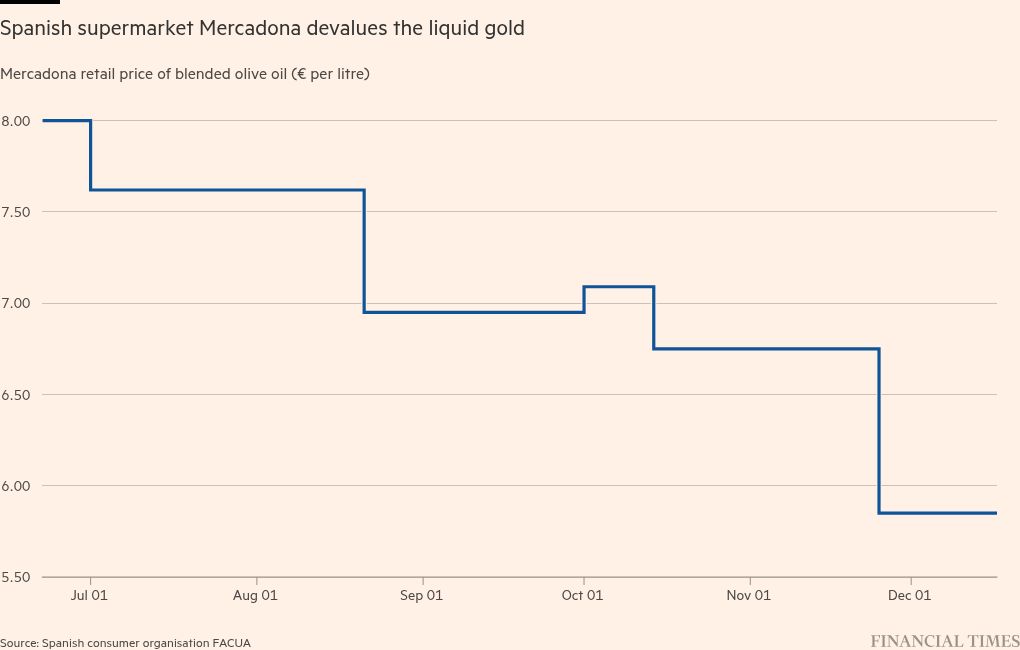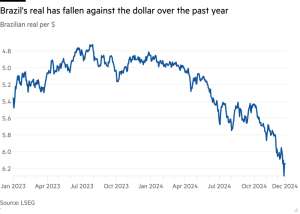The wondrous gift of open trade is given

Unlock the Editor’s Digest for free
Roula Khalaf, Editor of the FT, selects her favourite stories in this weekly newsletter.
As precious gifts go, olive oil, gallium and container ships don’t quite hold the same festive symbolism as gold, frankincense and myrrh. Yet as Christmas approaches, let us appreciate the true magi of globalisation in 2024: consumer rights activists from Spain, mineral dealers from Japan and shipbuilders from China.
The year has seen the usual stream of warnings that trade is about to collapse. There are fewer follow-up stories detailing how systems coped, how markets reacted and how problems moderated or disappeared. I may repeatedly harp on this particular theme but someone has to be a counterweight to the catastrophising about globalisation, and it turns out it’s me.
So let’s have a look at the crises that didn’t happen or eased this year. First up are the sharp increases in global olive oil prices, which more than doubled between mid-2022 and mid-2023, after droughts in Europe. Spain, the world’s largest exporter and one of its biggest consumers of olive oil, where it goes by the name of oro líquido (liquid gold), was understandably distressed.
What happened? Imports to Spain from Tunisia increased. Households modified their habits, switching from more expensive virgin to less expensive non-virgin blended types, or to sunflower oil. The consumer group FACUA put pressure on supermarkets by running a daily price comparator. Mercadona, the bellwether supermarket chain, repeatedly cut prices from July despite global markets remaining tight. A litre of its standard oil has now fallen from €8 to less than €6. The government helped by cutting VAT on olive oil sales.
Food costs pushed Spanish consumer price inflation higher than in some other European countries, but it’s a rich country and dearer oil did not exactly throw millions of households into abject poverty. Olive oil production is recovering from the drought and is expected to increase by a third in the 2024-25 harvest. By all accounts Spanish cuisine has, happily, survived.
Of course, climate change threatens crop production worldwide. It’s a colossal failure by humanity not to have addressed it. But its effects are mitigated by open markets and smart scientists. The threat of a global food crisis after Russia’s full-scale invasion of Ukraine in 2022 receded further this year, thanks to more bounteous harvests. Crop scientists and innovative agriculture have delivered consistently rising yields.

So, what other catastrophes were avoided? Last year ended with trade economists frantically googling “Houthi” to discover exactly who had bunged up the Suez Canal and driven up freight rates. As of this week, according to the specialist news service TradeWinds, the Houthis are reportedly considering running seminars on shipping security — astonishing brass neck if true.
More importantly, having initially fallen back early in the year, freight costs then shot higher again in the summer. The increase triggered a fresh round of the kind of warnings last seen in the Covid days of 2021 and 2022 that global shipping would permanently be affected. In the event, shipping industry experts say, it turned out to be a one-off burst of companies rebuilding inventories. Freight rates have fallen since, despite the global volume of containers being carried increasing.
The shipping industry is bracing itself for the possibility of a big reduction in China-US traffic if president-elect Donald Trump imposes high tariffs on imports from China. But the experience of his first term was those imports being replaced by goods from south-east Asian countries such as Vietnam, often adding another stage in the value chain. Shipping lines would have to adjust their routes, originating more journeys in Vietnam, but that’s a question of redirecting the same ships, not a fundamental rewiring of global trade. In any case, a stream of container vessels ordered in recent years, mainly from Chinese shipyards, has started to come into service.
Finally, another chapter of a long-running saga was written in 2024 by more announcements of restrictions on critical minerals, apparently designed to hobble strategic rivals by depriving their industries of key inputs. Two weeks ago, China said it was banning exports of antimony, germanium and gallium to the US, tightening up on restrictions it imposed last year.
The problem with this as a threat is that, according to customs data, the US has this year already essentially stopped importing germanium and gallium from China. And yet the American semiconductor producers that use the minerals haven’t noticeably ground to a halt. China continues to export to other countries, notably including Germany and Japan, suggesting that gallium ends up in the US via one route or another.
In any case, germanium and gallium aren’t uniquely found in nature in China: they’re extracted from zinc and aluminium ores. If prices are high enough, supply will come. The mining company Rio Tinto is looking to set up gallium production in Canada.
There will no doubt be more globalisation scares next year, some of them well founded. Of course Trump’s accession to the White House massively increases the genuine threat from governments’ interference in the trading system. But the countervailing forces remain, having had another good year. High prices induce more supply. Blocks on trade spur the creation of new routes. Consumers in high-income countries can absorb shocks. Flexible economies can adjust. All is not lost, and Christmas is coming up. God bless us, every one.
#wondrous #gift #open #trade








